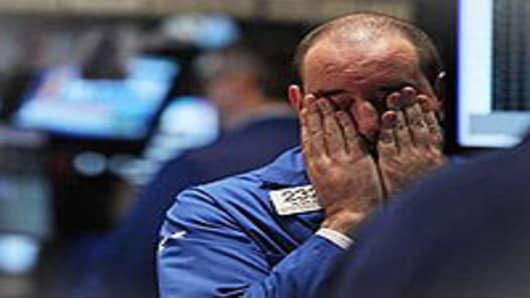Econorama
There are also a number of U.S. housing-related reports, including builder sentiment Tuesday; housing starts Wednesday and existing-home sales Friday. Housing has been the one data series that has shown improvement.
Adams said housing-related stocks are also one of the favorite plays of investors focused on domestic stocks. "Obviously the home builders are the first group that come to mind and those are fairly volatile and pricey options. There are other peripherals to play housing — consumer durables. Some of the specialty retailers have exposure to housing. Usually autos tend to trade in line with housing, but for most of this year the auto sector has done poorly, and a lot of the consumer space tends to benefit when housing benefits, " she said.
Lee said it appears consumers are feeling better because of the improvement in housing, but also the stock market, with the S&P 500 up 14 percent year-to-date. JP Morgan crunched the numbers and determined the gains in housing prices in 2012 amount to $1.7 trillion and the gain in stocks is $3.6 trillion, for a total $5.3 trillion, the biggest gain in household wealth ever. The increase in housing prices does not nearly match the steep decline, but it is the first increase since 2006.
"It explains why consumer confidence keeps going up. Consumer sentiment hit a new high today. It's not because jobs are picking up, " he said. Consumers spend more when they see asset values rise. "Historically five percent is spent in the following 12 months … The spending effect would be about $260 billion on incremental spending, " Lee said.
The improvement in consumer confidence may actually be something that helps President Obama, according to Dan Clifton, head of policy research at Strategas. He said the economic numbers were hurting the president until recently, and the race is now too close to call. He said the surprise decline in the unemployment rate to 7.8 percent was helpful to Obama because based on history, the president needs 7.6 percent unemployment to get 50 percent of the vote.
"The University of Michigan consumer sentiment is a great predictor of presidents getting re-elected, " Clifton said. Sentiment jumped to 83.1 Friday, close to the 83.5 level Clifton said the president needs to be re-elected. "It's been sitting at 72 all year, hanging out at Jimmy Carter and George Herbert Walker Bush levels — two guys that lost."
Europe will also stay in the headlines in the week ahead. There is an EU summit Thursday and Friday, at which leaders are expected to discuss budgets and tighter financial integration. Lee said Europe is making progress and beginning to stabilize, and that should help markets.
"We're getting the bad news in front of us, and out of the way and then we can focus on what's going to drive forward growth, " he said. "I think earnings revisions are going to turn positive soon. I think Europe is stabilizing and the U.S. demand story is better."
Adams, however, said she's concerned about what companies will say about future quarters when they report earnings. "What started in Europe became China's problem which is now our problem. It's a generalized slowdown and the only thing that seems to have improved modestly is the housing market and everything else seems to have slowed. It's fairly broad-based, " she said.
The fourth-quarter expectations for earnings per share imply a 16.5 percent increase year-over-year. While some of that is due to the easy comparison from last year, it still may mean estimates have to come down, she said.
What to Watch in the Week Ahead:
Monday
Earnings: Citigroup, Gannett, Charles Schwab
8:00 a.m. New York Fed President William Dudley
8:30 a.m. Retail sales
8:30 a.m. Empire State survey
10:00 a.m. Business inventories
12:45 p.m. Richmond Fed President Jeffrey Lacker
1:10 p.m. St. Louis Fed President James Bullard on economy
8:30 p.m. San Francisco Fed President John Williams
Tuesday
Earnings: Coca-Cola, Goldman Sachs, Johnson and Johnson, United Health, Intel, IBM, Mattel, PNC Financial, CSX, Cree, Intuitive Surgical
8:30 a.m. CPI
9:00 a.m. Treasury international capital flows
9:15 a.m. Industrial production
10:00 a.m. NAHB housing
12:00 p.m. Atlanta Fed President Dennis Lockhart
9:00 p.m. Second presidential debate
Wednesday
Earnings: Bank of America, Pepsico, American Express, Ebay, US Bancorp, Quest Diagnostics, Stryker, Kinder Morgan, Bank of NY Mellon, Blackrock, Northern Trust, Halliburton
7:00 a.m. Weekly mortgage applications
8:30 a.m. Housing starts
10:30 a.m. EIA oil inventories
Thursday
Earnings: Microsoft, Google, Morgan Stanley, Philip Morris, Travelers, Union Pacific, Verizon, Advanced Micro Devices, Nokia, Chipotle, Capital One, Sunoco, Key Corp, Genuine Parts, Danaher, Etrade
8:30 a.m. Jobless claims
10:00 a.m. Philadelphia Fed survey
10:00 a.m. Leading indicators
Friday
Earnings: General Electric, McDonald's, Schlumberger, Air Products, Honeywell, Ingersoll-Rand, Baker Hughes
10:00 a.m. Existing home sales
10:00 a.m. Regional/state employment data
Follow Patti Domm on Twitter: @pattidommQuestions? Comments? Email us at marketinsider@cnbc.com



